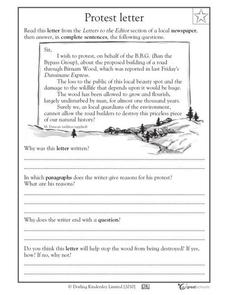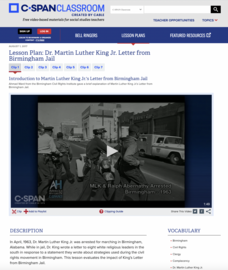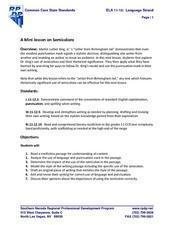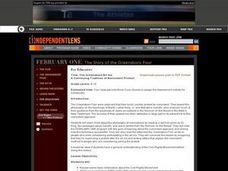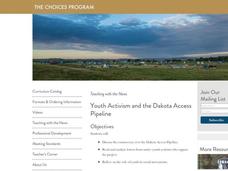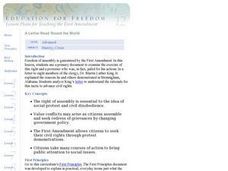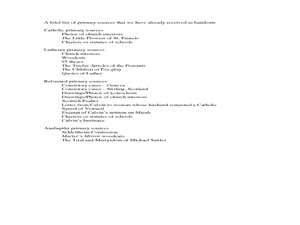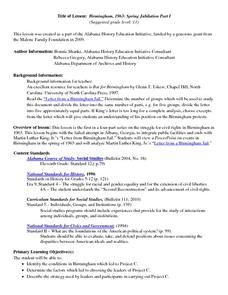Curated OER
Protest Letter
What a fantastic resource to guide youngsters in persuasive letter writing. They read a brief letter to the editor and answer question about the author's purpose, word choice, and structure. Next, scholars draft their own letter by...
National Endowment for the Humanities
Martin Luther King, Jr. and Nonviolent Resistance
Was nonviolent resistance the best means of securing civil rights for black Americans in the 1960s? In this highly engaging and informative lesson, your young historians will closely analyze several key documents from the civil rights...
Curated OER
Socratic Seminar on Martin Luther King, Jr.’s Letter From Birmingham Jail
Key in the struggle to gain the rights of democratic citizenship was the April 1963 arrest of Dr. Martin Luther King, Jr. for civil disobedience. To deepen their knowledge and understanding of events during the civil rights movement,...
Newseum
Making a Change: Letter From Birmingham Jail
Martin Luther King Jr.'s "Letter From Birmingham Jail" was written in response to "A Call for Unity," written by eight white ministers from Birmingham and published in the local newspaper. After reading both letters and following a list...
C-SPAN
Dr. Martin Luther King Jr.'s Letter from Birmingham Jail
Timing is everything. Introduce young historians to Dr. Martin Luther King, Jr.'s "Letter from Birmingham Jail" with a resource that underscores the significance of the timing of the Good Friday Birmingham march, King's subsequent...
DocsTeach
Analyzing a Letter to Congress About Bloody Sunday
The brutality of Bloody Sunday—when non-violent protesters who supported voting rights for African Americans were beaten by police—captured a nation. Young historians examine the letter of one horrified American to Congress to consider...
Southern Nevada Regional Professional Development Program
A Mini lesson on Semicolons
Dr. Martin Luther King, Jr.'s "Letter from Birmingham Jail" serves as an exemplar for a mini-lesson on semicolons. Working alone or in small groups, class members first circle all the semicolons in the letter, and then consider how this...
Houghton Mifflin Harcourt
Renaissance and Reformation Test Preparation
This multiple-choice assessment on the Renaissance and Reformation reviews topics from humanism and the protests of Martin Luther to Italian city-states. While this is a traditional assessment designed by a textbook publisher, you can...
Curated OER
The Greensboro Sit-Ins: A Continuing Tradition of Nonviolent Protest
Students watch a video about nonviolent protests during the Civil Rights Movement. They discuss and write about the Greensboro sit-ins while deciding the effectiveness of this type of protest.
Brown University
Youth Activism and the Dakota Access Pipeline
Do young people have a role in social movements? Should they? The involvement of young people in the Dakota Access Pipeline is the focus of a resource that asks class members to examine letters written by native youths who oppose the...
Constitutional Rights Foundation
Options for Affecting Public Policy
Letter-writing, e-mail and telephone campaigns, petitions, marches, meetings, with lawmakers. Options for influencing elected representatives are the focus of resource that details how to craft each of these approaches to influencing...
Curated OER
A Letter Read 'Round the World
Learners examine primary document to examine the concept of free assembly, and analyze Dr. Martin Luther King Jr's letter to the clergy to explain the rationale for this tactic to advance civil rights.
Curated OER
Primary Source Analysis: 95 Theses Excerpts
By reviewing and analyzing these nine selected points from Martin Luther's 95 Theses, your young historians will discern the major tenets of the revolutionary challenge made against the Catholic Church in the seventeenth century. This is...
Curated OER
Making Art That Matters (Printmaking Option)
Students plan and execute a relief print that attempts to protest or persuade. They focus on effective definition of shape, use of symbols, and impact on their intended viewers.
Curated OER
Can Forgiveness Lead to Nonviolence?
Tenth graders determine if forgiveness can lead to nonviolence. In this nonviolent resistance lesson, 10th graders discuss the concept of forgiveness and read examples of the forgiveness that Gandhi granted. Students write letters of...
Curated OER
Ideas have Consequences—The Reformation
Students examine information regarding the Protestant Reformation. In this primary source analysis lesson, students read teacher-selected primary sources that enable them to analyze the ideas and consequences of the Reformation.
City University of New York
Women's Suffrage and World War I
Democracy cannot exist where not everyone has equal rights. Discuss the state of democracy and women's suffrage during World War I with class discussions, debates, and primary source analysis, in order for class members to connect with...
Curated OER
A New York Rioter Explains His Opposition to the Draft
In this primary source analysis worksheet, students analyze a letter from a New York rioter over the Conscription Act. Students respond to 3 short answer questions about the letter to the editor of the New York Times.
Curated OER
Billie Holiday's Song "Strange Fruit"
Pupils analyze a variety of primary source materials related to lynching (news articles, letters written to or written by prominent Americans, pamphlets, broadsides, etc.) in order to assess the effectiveness of the anti-lynching...
Curated OER
The Movement Before the Movement: Civil Rights Activism in the 1940s
Many educators focus on the civil rights movement as it occurred after Rosa Parks incited the bus boycott. Extend the understanding of the fight for civil rights in the United States with this post-WWII lesson. Learners examine and...
Alabama Department of Archives and History
"Scottsboro Boys": A Trial Which Defined an Age
Here's a must-have resource. Whether your focus is racism, the Great Depression, the "Scottsboro Boys" trial, or part of a reading of To Kill A Mockingbird, the information contained in the seven-page packet will save hours of research...
iCivics
Students Power Elections
A Students Power Elections resource guide provides would-be voters with the guidance they need to become voters. Included in the packet is information about voter registration and voting, how to research candidates and ballot measures,...
Benjamin Franklin Tercentenary
Reading the Work of B. Franklin, Printer
Placing Ben Franklin’s ideas about a free press next to those embodied in the First Amendment sheds light on both. Learners interpret and compare two primary sources and then examine them in the light of a contemporary survey about...
Alabama Department of Archives and History
Birmingham 1963: Spring Jubilation Part 1
As part of a study of the 1963 quest for civil rights in Birmingham, Alabama, class members view a PowerPoint that details the struggle and analyze Martin Luther King, Jr.'s "Letter from a Birmingham Jail."


